
In the first episode of a series of excerpts from the memoirs of Lebanon’s Parliament Speaker Nabih Berri, Asharq Al-Awsat sheds light on the last meeting between Berri and late former Prime Minister Rafik Hariri, the day of his assassination on Feb. 14, 2015.
The memoirs entitled, “Al-Thuqb al-Aswad” (The Black Hole), edited by Nabil Haitham, will soon be published by Dar Bilal.
Berri describes the year 2005 as the worst in the history of Lebanon, as it was devastated by Hariri’s assassination.
On Monday, February 14, 2005, Prime Minister Rafik Hariri arrived at the Parliament before noon.
A crowd of deputies gathered in the public hall, while well-trained media professionals waited in the outer lobby to keep abreast of the event: the parliamentary elections law was the main subject of discussion in a session of the joint parliamentary committees that was scheduled for the day.
The general political atmosphere was tense. The distribution of electoral districts stirred confusion and internal political disputes, especially over the Beirut constituencies. Hariri was trying to confront what he considered at that time electoral distributions that aimed at undermining him.
From Parliament’s outer courtyard, Hariri made his way towards the corridor leading to the speaker’s wing. He met with Minister Ali Hassan Khalil and the two men walked together to the office of the Director of Protocol in Parliament, Ali Hamad. They stayed there for about three quarters of an hour, where they mainly discussed the electoral law. Hariri was not comfortable... he was wary of the distribution of some electoral districts, specifically in Beirut. He described some politicians’ attempts as “vengeful”.
Hariri told Khalil that it was very necessary to reach a consensual electoral law, because tension would not serve this purpose, but would keep matters in a vicious circle.
“I am open to solutions in order to reach a consensus, and I am ready to proceed immediately to a settlement that will lead to an understanding on the election law,” he told Khalil, as quoted in Berri’s memoirs.
Hariri was reassured with the position of Berri, which was conveyed to him by his political aide. He told Khalil: “I am satisfied with the position of Berri… I seriously tell you that I support any discussion that leads to agreement on a law… You can talk about this issue with [then-Interior] Minister Suleiman Franjieh.” Khalil agreed to his request.
At the end of the meeting, Hariri and Khalil left the office of the Protocol Director. The former premier entered Berri’s office, where he stayed for a short time, and then went out to see Khalil about to attend a joint committee session in Parliament’s hall.
Hariri quickly reached to the minister and told him: “Come on, let’s go have coffee.” (He was heading to Café L’étoile, facing the Parliament building, as some friends were waiting for him there). Khalil replied: “I cannot. I want to attend the committee meeting.”
Hariri joked with him, saying: “You don’t want to miss the meeting, or you’re running away because you’re afraid being seen with me?”
Khalil replied, amused: “No, I swear I want to attend the session!”
The two men laughed, shook hands, and Hariri walked out of Parliament, after whispering in Khalil’s ear an expressive message to Berri.
This was Hariri’s last stop in the House of Representatives. He had a cup of coffee at L’étoile and left a few minutes later. That was the last trip that took him to the assassination point facing the St. George Hotel.
Berri recounts his last encounter with the late prime minister:
“I was in Parliament as usual, MP Mohammad Safadi asked me for a short meeting, and as soon as we started talking, Hariri slightly opened the door of my office and I invited him to join us…”
“He entered, approached us with quiet steps, greeted us, and we shook hands. He was smiling warmly… Then we started talking about some matters, some of which were personal, and others general... I noticed that day that he was smiling a lot.”
Berri continues: “After leaving my office, he met MP Ali Hassan Khalil, and sent me a verbal message in which he said: ‘Tell your teacher, no matter what... he will not meet any person who more loyal than Rafik Hariri to him.’
“I was talking on the phone with Hussein al-Husseini, when I felt a powerful blast. The office door shook… Glass fell from the ceiling of the public hall… The sound was very loud. I felt that the explosion had taken place near the Parliament building.
“A Few moments later, I received the tragic news: Rafik Hariri was killed.
“At that moment, I realized that an earthquake had struck Lebanon, and turned it upside down, leading it towards danger and the unknown.
“This cowardly operation targets Lebanon, in its national unity, economy, mission, and security stability. I call on the Lebanese to be wary of this conspiracy targeting Lebanon, through this horrific crime, and to close ranks and rise to the level of national responsibility,” Berri wrote in Hariri’s obituary.
The speaker recounts: “The funerals took place in Beirut on February 16, 2005. I sat between former President Amin Gemayel and [Syria’s] Abdel Halim Khaddam, who had arrived in Ain al-Tineh and went with me to the ceremony. We were also accompanied by Amr Moussa.
“Chaos was overwhelming and crowds came in huge numbers… The scene was impressive and sad...
“I felt great sadness for Prime Minister Rafik Hariri. Once they asked me about my relationship with him, and I said that a long history brought us together; we became friends, quarreled and reconciled, over and over... In short, Rafik Hariri was a friend.
“They asked me many times: Who benefits from the assassination of Prime Minister Rafik Hariri? My answer was clear: The only beneficiary is the enemy of Lebanon… those who want to destroy Lebanon… The Lebanese know who their enemy is... Israel.”
The parliament speaker says that Hariri’s assassination dragged the country into an extremely dangerous and complex internal situation. The political crisis reached an unprecedented level ignited by harsh and direct accusations against what was called the “Lebanese-Syrian security system” at the time.
The Lebanese people were divided between two opposing camps: The March 8 and the March 14 forces.
Amid sharp divisions between the two colliding fronts, Lebanon endured tumultuous years of division over a number of issues, such as the Special Tribunal for Lebanon, Syrian troop withdrawal from Lebanon, the weapons of the resistance [Hezbollah], UN Security Council resolution 1559, and the presidential elections at the end of President Emile Lahoud’s term.
Berri says that following the resignation of Prime Minister Omar Karami’s government under street pressure, tension mounted and divisions deepened further. The country became even more divided, with rival camps trading offensive accusations, which put the country on the “crater of a political volcano in every sense of the word.”












